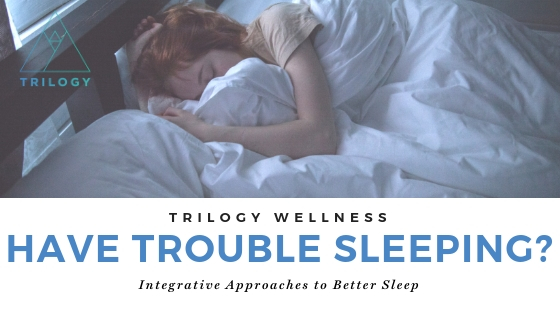
Tips for Better Sleep
Some of us experience straight up insomnia (the inability to fall asleep), while others may fall asleep just fine but find themselves waking up throughout the night. Both of these issues should be addressed as they can limit you from getting into deep and restorative sleep.
Some factors that contribute to disturbed sleep include stress and anxiety, intake of stimulants (caffeine, sugar, processed foods), adrenal issues, pain, hormonal imbalance, nutritional deficiencies and lack of exercise. So, to get to the root cause of your sleeplessness, it may be beneficially to explore what your cause/s may be and address them head on.
Here are some tips to help you restore your sleep:
Nutrition:
Limit your intake of refined and processed foods. These foods can cause blood sugar issues which can impact your sleep. You want to opt for fiber-rich and slow burning carbohydrates foods like vegetables, grains, legumes and healthy fats to help sustain your blood sugar throughout the day and through bedtime. You also want to limit stimulating foods like caffeine and chocolate and avoid alcohol and heavy meals especially close to bedtime.
Lifestyle:
About an hour before bedtime, you want to aim for little to no bright light or blue wave lighting (cell phones and computers). The decrease in light helps our brains to produce melatonin which is the sleep time hormone. You also want to make sure you are getting in regular exercise, as it can help you burn off excess energy which can help fatigue your body and help you get more restful sleep. Another lifestyle tip you may want to start including in your daily life is prioritizing stress-management. Many of us have a hard to falling and staying asleep simply due to the fact that we have too much on our minds.
Alternative Medicine:
Aromatherapy – Essential oils such as lavender, cedarwood and bergamot all tend to produce sedating effects. You can diffuse these into the air to create a relaxing environment. **Please note that some essential oils can be toxic to pets so please do your research beforehand.
Acupuncture – Incorporating acupuncture into your wellness routine may be beneficial for your sleep. Acupuncture is said to help increase our natural melatonin production, ease anxiety and stress and can also provide pain relief.
Cannabis – There are a variety of products and strains on the market that can help improve your sleep. Indica strains tend to produce a relaxing and sedating effect that could be great for evening relaxation. Look for strains that are high in myrcene, caryophyllene and terpinolene as these terpenes also tend to produce sedating effects. For long lasting relief, using tinctures and/or edibles could be a nice option as their effects can last up to 8+ hours. For those who do not want any psychoactive effects, CBD and CBN products could help do the trick as they both can produce relaxing and sedating effects with little to no impairment.
